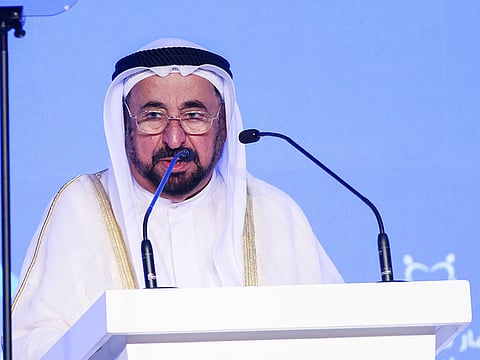Save youth from extremism, says Sharjah Ruler
Dr Shaikh Sultan calls for security and support for youth at ‘Investment in the Future’ forum

Sharjah: The ‘Investment in the Future’ (IIFMENA) conference opened in Sharjah on Wednesday, with a message to save youth from extremism and provide employment opportunities for them.
The call came from His Highness Dr Shaikh Sultan Bin Mohammad Al Qasimi, Member of the Supreme Council and Ruler of Sharjah, during his opening remarks at the conference, which ends on Thursday.
The third edition of the conference, held every two years, is being held under the theme of ‘Youth — Crisis, Challenges and Development Opportunities’. The conference is organised by The Big Heart Foundation (TBHF), a Sharjah-based international humanitarian body focused on humanitarian and development challenges in the Middle East and North Africa (Mena) region.
Dr Shaikh Sultan Bin Mohammad Al Qasimi, Dr Sultan Bin Mohammad Al Qasimi, Hessa Bint Eisa Bu Humaid and Nadia Murad at the opening ceremony of the Investing in the Future conference in Sharjah. Ahmed Ramzan/Gulf News
More than 600 local and international officials, experts and youth are meeting at Al Jawaher Reception and Convention Centre to discuss youth-related issues in the region, especially those that emerge from war, conflict and natural disasters.
Serious concerns
In the opening session, Dr Shaikh Sultan told delegates he hopes the event’s sessions will produce suggestions for the most effective ways to prevent youth from falling victim to extremism, which he said was “destroying our societies in the region”.
He said youth should be provided a stable and supportive environment. Dr Shaikh Sultan also called for that support to be in “alignment” with the capabilities of youth today, so they can realise their full potential and contribute to society’s development.
He added that “today’s world is a world of knowledge” and youth have to compete closely to acquire and develop all branches of knowledge.
Dr Shaikh Sultan also told schoolchildren attending the event and the youth in general that “we are here for you”.
Also speaking during the opening session was Yazidi activist Nadia Murad, the Nobel Peace Laureate for 2018. She told the audience that the international community has failed to reconstruct the Sinjar province that is home to the persecuted Yazidi ethnic minority that she belongs to.
Murad, who was taken captive and abused by the Daesh terror group in 2014, said her survival has the “greater purpose” to be a voice for women and minorities.
‘Falling prey’
In a recorded message, Shaikha Jawaher Bint Mohammad Al Qasimi, chairperson on TBHF, addressed delegates by saying youth were “falling prey” to conflict and crises in the region. She added that their trust can be regained by investing in them, reassuring them that IIFMENA “is your platform and Sharjah is your city”.
Mariam Al Hammadi, director of TBHF, said the societal and economic crises in the region are “unprecedented”. She added that many people in the region “don’t know where they belong”, referring to identity issues facing youth. She also said many people have lost their jobs.
Al Hammadi said the solution was partly in the hands of youth who can “mould their future”. However, it would require “a common destiny” as “prosperity depends on united efforts”.
Skills gap
Dr Ahmad Bin Abdullah Humaid Belhoul Al Falasi, Minister of State for Higher Education and Advanced Skills, said the Fourth Industrial Revolution was making a huge impact on youth, who in turn are a sizeable demographic in the region. Youth under 35 years of age represent 75 per cent of the population in the Middle East, he said, quoting studies.
If such a segment is not equipped to face the job market, which is increasingly led by the ‘knowledge economy’ and technology, there will be a glaring gap in graduates’ skills set, Dr Al Falasi warned.
National priority
Hessa Bint Essa Buhumaid, Minister of Community Development, said youth development was a priority for the UAE and officials will be studying the impact of such strategies. She also referred to several programmes bringing youth close to decision makers in the public and private sectors.
Identity crisis
The opening session concluded with remarks from Ahmad Aboul Gheit, Secretary-General of the Arab League. Gheit said the youth is “facing crises it didn’t create”, adding that “it would be a mistake to let them bear the responsibility of these crises”. He was referring to the identity crisis and generational gap facing the youth, wherein they feel alienated from their culture and the older generation.
Sign up for the Daily Briefing
Get the latest news and updates straight to your inbox



